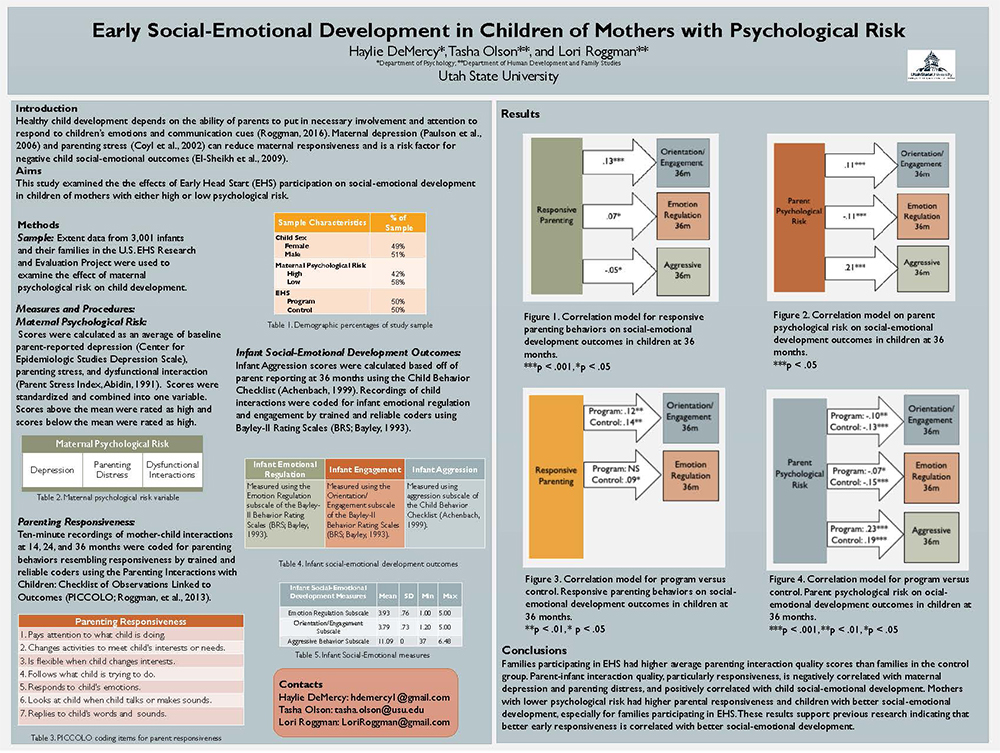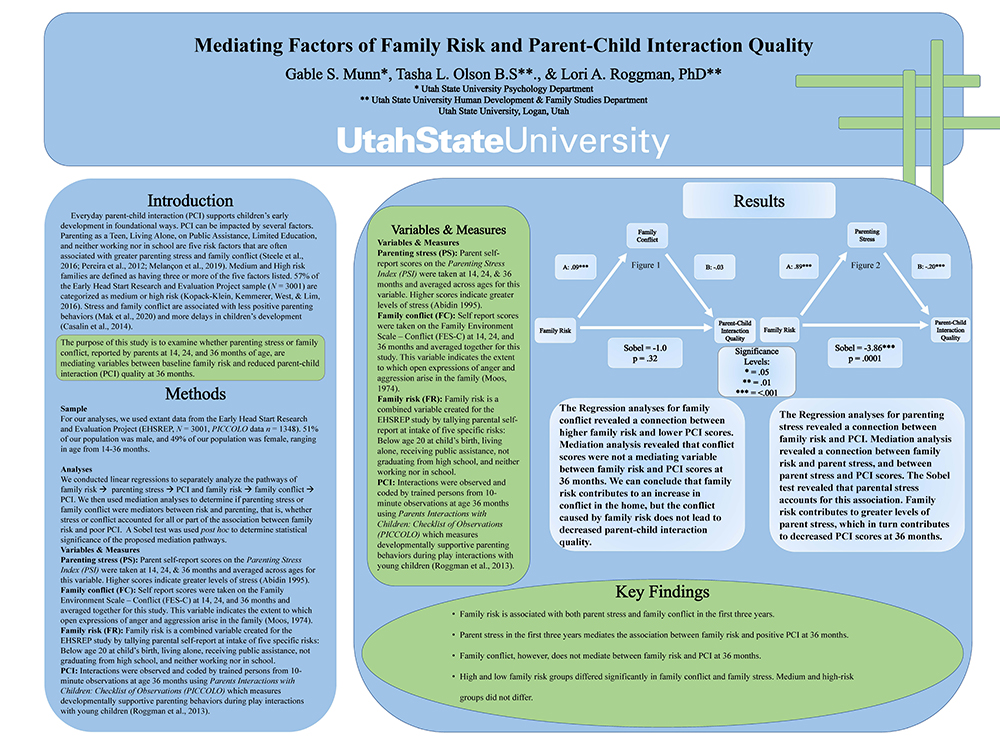Fall Student Research Symposium
Thursday, December 10th, 2020
Online Event: 10:00am - 2:00pm MST
This year, despite the challenges in conducting and presenting research during a global pandemic, three undergraduate students from the Department of Psychology will be presenting at the USU Fall Student Research Symposium, an all-virtual event. Learn more about the undergraduate students, their research, and sign up to attend a virtual poster session or live oral presentations.

Haylie DeMercy - Supporting Early Social-Emotional Development in Children of Mothers with Psychological Risk through Early Head Start
Healthy child development depends on the ability of parents to put in necessary involvement and attention to respond to children’s emotions and communication cues (Roggman, 2016). Maternal depression (Paulson et al., 2006) and parenting stress (Coyl et al., 2002) can reduce maternal responsiveness and is a risk factor for negative child social-emotional outcomes (El-Sheikh et al., 2009). The purpose of this study is to investigate how participation in Early Head Start (EHS), an early intervention program that provides families with individualized intervention services, affects social-emotional development for children of mothers with high and low psychological risk.
Extant longitudinal data from the U.S. EHS Research and Evaluation Project, a nationwide study of infants (n=3,001) and their families, were used to examine the effect of maternal psychological risk on child development in the context of EHS services. Mothers reported parenting distress using the Parenting Stress Index (Abidin, 1995) and depression using the Center for Epidemiologic Studies Depression Scale (Radolff, 1991) at 14 months. Parent-infant interactions, including parental responsiveness, were video recorded and coded at 14, 24, and/or 36 months using the Parenting Interactions with Children: Checklist of Observations Linked to Outcomes (Roggman et al., 2013). Child social-emotional development was measured using the Behavior Rating Scales of the Bayley Scales of Infant Development (Bayley, 1993) and the aggression subscale of the Child Behavior Checklist (Achenbach, 1999).
Families participating in EHS had higher average parenting interaction quality scores than families in the control group. Parent-infant interaction quality, particularly responsiveness, is negatively correlated with maternal depression and parenting distress, and positively correlated with child social-emotional development. Mothers with lower psychological risk had higher parental responsiveness and children with better social-emotional development, especially for families participating in EHS. These results support previous research indicating that better early responsiveness is correlated with better social-emotional development.

Gable Munn - Meditating Factors of Family Risk and Parent-Child Interaction Quality
Medium or high family risk is defined as having 2 or more risk factors as present in intake surveys in the Early Head Start Research and Evaluation Project (EHSREP). Previous research has shown that high and medium risk families are more prone to negative parent-child interactions (Steele et al., 2016), but mediating variables are not clear. We hypothesize that parental stress and familial conflict are significant mediating variables between family risk and parent-child interaction quality. We also suspect that stress will have a more significant effect (Mak et al., 2020). The present study used extant data from the EHSREP (N=3001) for our analysis. We utilized self-reports taken from the Parenting Stress Index (Abidin, 1995) as data for the stress variable. Family Environment Scale (Moos, 1974) data was used for the conflict variable. Parent Interactions with Children: Checklist of Observations (PICCOLO) scores at 36 months were used as a measure of parent-child interaction. Multiple regression and mediation analyses were the analysis methods chosen for this study. Our mediation analyses for FES measures revealed that family risk and conflict are correlated, but conflict was not correlated with PICCOLO scores at 36 months. Thus, family risk does lead to greater conflict, but greater conflict does not lead to lower PICCOLO scores at 36 months. Our mediation analysis for PSI data revealed that stress is a mediating variable between family risk and PICCOLO scores at 36 months. Family risk and PICCOLO scores at 36 months are strongly correlated. To reduce negative parent-child interactions, it may be prudent to provide stress management techniques to parents of at-risk families.



